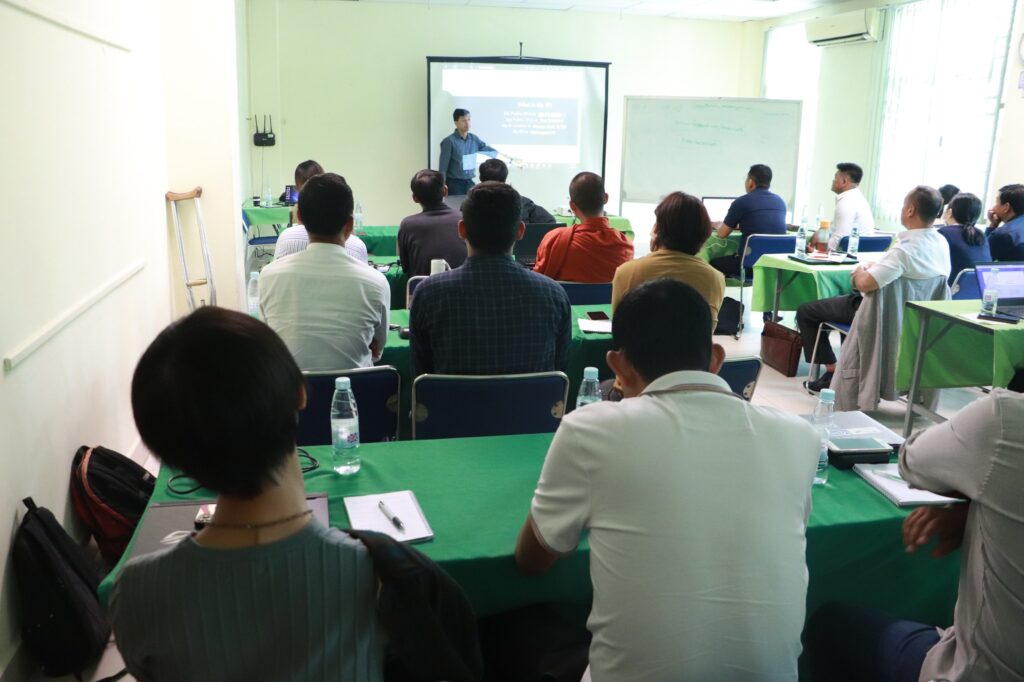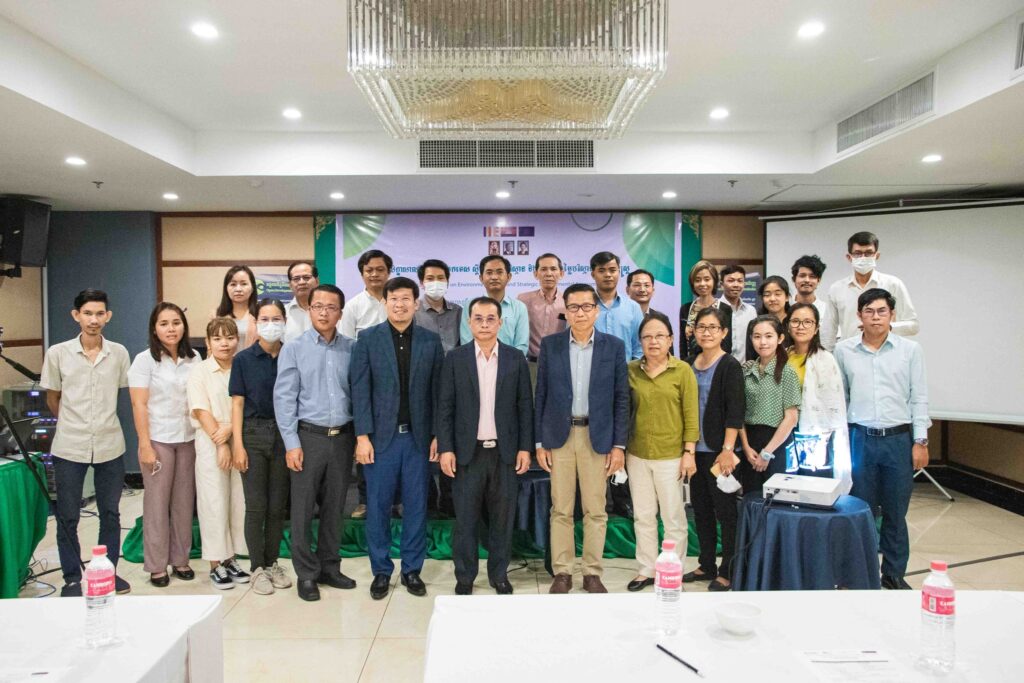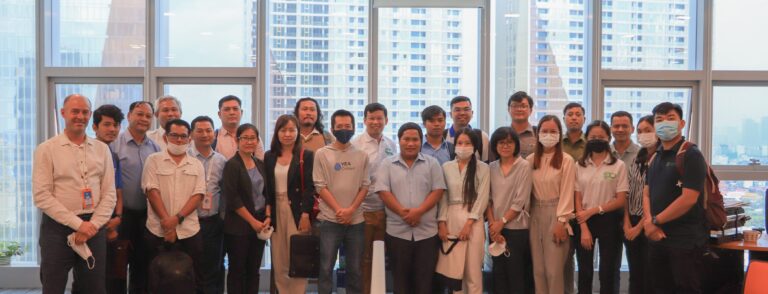- Learning Platform
- Blog
- Indigenous peoples sectoral advisory meeting
On 08 February 2023, ODC organized the “Indigenous Peoples Sectoral Advisory Meeting” with the partners, including Conserve Indigenous Peoples Languages Organization, MyVillage Cambodia – MVi អង្គការ ភូមិខ្ញុំ, Forests and Livelihood Organization FLO, Cambodia Indigenous Youth Association-CIYA, and FHI 360 to identify the challenges, activities, roles of the group, and call for new members.
The project is funded by USAID Cambodia through FHI 360 under Cluster Anchor Grant from the Civil Society Support (CSS) Project.



Other Stories
Cybersecurity Training
On 04th July 2023, Open Development Cambodia (ODC) conducted training on cybersecurity for the CSS-cluster members and their networks. The training course aims to raise awareness of the cluster member on cyber security as well as digital security including password management, safe internet browsing, email security, and mobile security. We also provided participants with the essential skill to cope with issues related to cyberattacks and safeguard personal data and accounts. There are 32 participants (12 females) joining the training from ADHOC, NEP, YEA, Epic Arts, CHRAC, SVC, Bophana Center, CENTRAL, LoveIsDiversity, and other networks. To assess capacity, all trainees are required to complete the pre-test. Mr. NGET Moses, Digital Security Consultant, asked each trainee to introduce themselves, their position, organization, and their expectations of the training at the start of the training in order to understand their background and needs. He started the lesson on “password management” by providing an overview of passwords, creating strong passwords, and password managers. The questions were discussed around the topic with actual examples. He continued to the next lesson “safe internet browsing” which highlighted the threats and how to do safe browsing and virtual private network. Email security and mobile security are also very important for trainees. In this session, the trainer demonstrated how to secure mobile devices and emails. The session concludes with a summary of the lessons and a post-test to assess the trainees’ understanding. The evaluation was also requested in order to improve training. One of our trainees, SENG Sokcheat, a member of LoveIsDiversity express, “I think this training is very important as it helps us protect our privacy from online scammers. Also, everyone who is using social media, internet, or other online services should join this training.” The training was conducted under the Learning Platform (LP) project which was funded by the United States Agency for International Development (USAID) through Family Health International (FHI 360) as part of the Civil Society Support (CSS) Project.
- CybersecurityTraining
- 06 Jul 2023
- 2100
Environmental data and strategic environmental assessment (SEA)
Phnom Penh, 03rd November 2022, Open Development Cambodia (ODC) hosted a Technical Workshop on Environmental Data and Strategic Environmental Assessment (SEA). This workshop was supported by the United States Agency for International Development (USAID) through Family Health International (FHI 360) under Cluster Anchor Grant from the Civil Society Support (CSS) Project and Heinrich Böll Stiftung (HBS) under Promoting Environmental Impact Assessment (EIA) for a more Transparent and Responsive Environmental Governance in Cambodia Project. The workshop aims to: Raise awareness of the SEA among CSOs, citizen journalists, indigenous people, and researchers. Discuss and share the current statue of the SEA in Cambodia Identify the potential of integrating SEA and its implication in environmental and natural resource management. The event brought together 32 participants (11 females) from the Ministry of Planning (MoP), World Wide Fund for Nature (WWF), Wildlife Conservation Society (WCS), Family Health International (FHI 360), other international and local non-governmental organizations (NGOs), community-based organizations (CBOs), journalists, researchers, and indigenous peoples (IPs). Environmental Impact Assessment (EIA) and Strategic Environmental Assessment (SEA) Mr. THY Try, Executive Director/Editor-in-Chief of Open Development Cambodia, and Mr. MATHEW Baird, Director of the Asian Research Institute for Environmental Law, have highlighted the differences between EIA and SEA as well as some procedures of SEA. Development projects typically promote economic development, but they should not neglect or ignore the impact on the environment and society. SEA incorporates environmental considerations into policies, plans, and programs (PPP). SEA is used to estimate and evaluate the consequences of specific development PPP. It means that the project is not there yet. The government will decide whether the project could be implemented or invested in that area. It usually happens before doing the EIA. In contrast to the commonly used EIA, which occurs after the decision-making process, SEA occurs before all important decisions, which offers significant advantages. It was initially promoted to fill gaps in project-based EIA due to the limitation of EIA to address the environmental policy integration at the strategic levels, particularly during policy and plan-making. The capacity of EIA to account for the strategic consequences of subsequent projects in a single area is limited. As a multi-stage process focusing on overall sustainability, SEA takes a proactive approach to all development activities, identifying key obstacles before final approval. Public participation is the key point, and it must be included in both SEA and EIA processes. EIA and SEA complement each other. It does not mean that we can ignore one of them. Mr. THY Try also demonstrated a video about the UNECE SEA Protocol, which was created by the United Nations Economic Commission for Europe (UNECE) as part of the EU-funded program “Greening the Economies in the European Neighborhood.” The protocol establishes clear and transparent procedures for incorporating environmental and health concerns into national development plans, programs, and legislation. Spatial Plan and its Integrated Landscape Approach Mr. SENG Teak, Country Director of the World Wide Fund for Nature (WWF), presented one of the significant implementations called the “Mondulkiri Provincial Spatial Plan.” He highlighted the 2040 scenario-based analysis for the province divided into three scenarios: conservation, green economy, and business-as-usual. The first scenario, “conservation,” could keep the forest cover in Mondulkiri up to 85% by mainly protecting all forests inside and outside the protected areas (PA) and using non-forest areas for agricultural and development areas. The second scenario, “green economy,” only protects the forest in the PA, whereas the forest outside the PA and non-forest areas are used for agricultural development areas. By doing so, the forest cover in the provide will remind 53% by 2040. In the last scenario, “business-as-usual” will not enforce forest protection, and the forest cover will remain at only 34%. In brief, the second scenario is used for the spatial plan for Mondulkiri and will be adopted shortly. The spatial plan is critical because it has the potential to provide effective development principles and tools for informed decision-making and spatial development processes to promote balanced territorial development. The planning could be done by following significant steps, including establishing a multi-stakeholder platform, building a shared understanding, collaborative planning, implementing, monitoring for adaptive management and accountability, and shaping the context. The potential of SEA Integration and its Implication on Natural Resource Management H.E. NOR Vanndy, Director of the Economic Statistics Department, National Institute of Statistics, Ministry of Planning (MoP), and Mr. TEP Sakmakara, Deputy Chief of Office of the Department of Economic Statistics, MoP, highlighted how the ministry addresses the environmental data and issues in the development plan. Integration of environmental issues in the development plan is the initial stage, and the country should do it. Environmental issues are considered to include in long-term and medium-term development plans such as National Strategic Development Plan (NSDP) and Sector Development Plan. It was observed that the integration of the environmental issues in the previous NSDP (2014-2018) is less and not paid much attention. Therefore, the government has considered and added more environmental issues to the new NSDP (2019-2023). Chapter 4 (4.42) of the NSDP (2019-2023) “Promote the inclusion of strategic environmental assessments in the decision-making process, policies, plans, and legal documents to ensure the sustainability of the environment and natural resources.”
- Environmental impact assessment (EIA)Land and natural resources
- 08 Dec 2022
- 3479
The initial cluster convention
The Initial Cluster Convention was held on September 13, 2022, at the FHI 360 Office in Phnom Penh, with 29 participants (10 females), including 06 indigenous peoples. The convention brought together media organizations, civil society organizations (CSOs), and community-based organizations (CBOs) working on indigenous peoples, natural resources, forestry, land, and the environment. Open Development Cambodia (ODC) organized the convention, which was funded by the United States Agency for International Development (USAID) through Family Health International (FHI 360) as part of the Civil Society Support (CSS) Project: Cluster Anchor Grants. ODC is the anchor and collaborates with three cluster members: CamboJA, the Conserve Indigenous Peoples Language Organization (CIPL), and Young Eco Ambassadors (YEA). The project aims to make natural resource management (NRM) more sustainable, inclusive, and participatory by incorporating Indigenous Peoples\' needs and concerns. The projects contain 26 major activities. One of the important parts is the convention, which clusters members and the host of their network to share lessons learned, information, and prioritized issues on natural resource management, environment, forestry, land, indigenous peoples, Strategic Environmental Assessment (SEA), and Environmental Impact Assessment (EIA). The cluster members will be integrated through physical meetings as a project initiative. ODC hosted the initial cluster convention, which brought together all cluster members and networks to build networks, learn from one another, map the effective strategy, and pave the way for future NRM advocacy activity in Cambodia. As a result, the initial cluster convention has four core objectives, including: Explaining the nature of cluster formation and the roles of each cluster Create a friendly learning and sharing environment for cluster members and their networks Keep current priority environmental issues, as well as environmental laws and regulations, up to date Encourage cluster members and stakeholders to work together. Natural resource management issues are arising in the country, particularly land grab and encroachment, economic land concession, communal land titling, forestry, and environment and social fund, among others. On the other hand, the prioritized issue could be related to forestry. Many CSOs fail to focus on the Investment Law, which is at the heart of the development project, causing many problems for local communities. The law should be thoroughly reviewed, particularly regarding indigenous peoples and natural resource management. If the law is not carefully studied, residents may face difficulties if there are any development projects or investments in their areas. The communities lack precise information on the development project and strategy that address the issues. Natural resources are indigenous peoples’ last hope; therefore, they must be protected. As a result, indigenous peoples should broaden their alliances in each campaign and workshop.
- Ethnic minorities and indigenous peopleLand and natural resources
- 27 Sep 2022
- 1718


